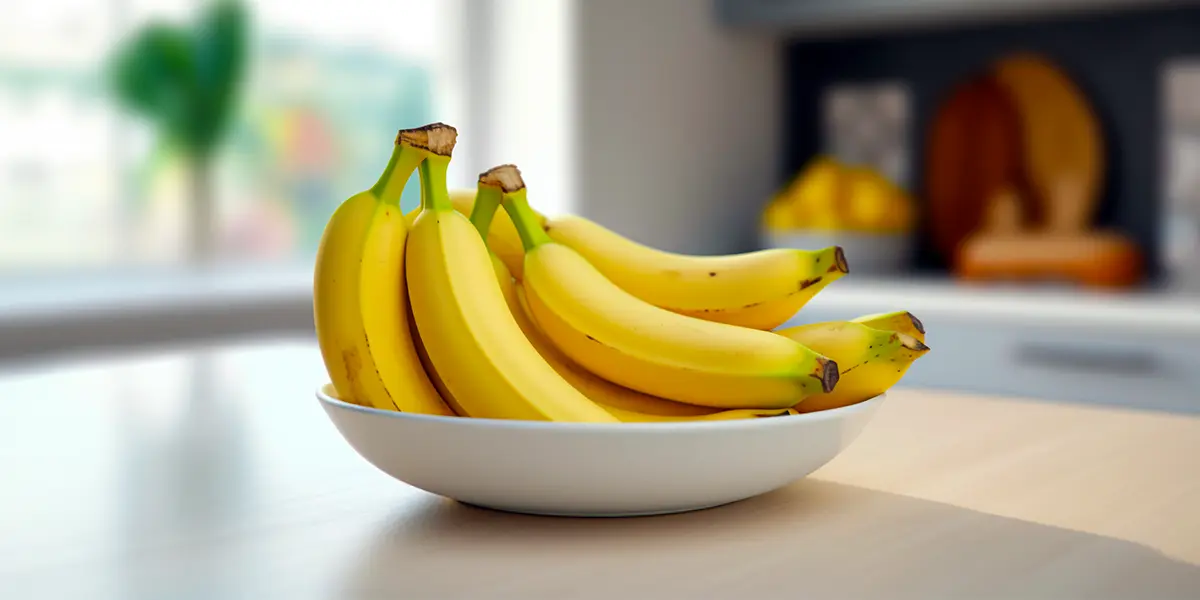Is Banana Good for Weight Loss?

You may have heard advice from your grandparents advising you to eat bananas because they are good for your health and help you gain weight. Additionally, when someone with a lean physique wants to put on some weight, the common recommendation is to include bananas daily in their diet.
This is all true if your goal is to gain weight. But what if you want to lose weight? Many of us may wonder: Can you eat bananas if you want to lose weight?
So, in this blog, let’s find out the answer.
What are the Nutritional Benefits of Bananas?
Bananas are packed with essential vitamins and minerals that our bodies need. For example, according to IFCT 2017, just 100 grams of banana provide:

These nutrients make bananas a healthy choice for anyone, irrespective of whether you are trying to lose weight or not.
On top of that, bananas offer plenty of other health benefits.
- They are rich in Vitamin C, which helps boost your immune system, and Vitamin B6, essential for brain development and function.
- They also have potassium, which regulates heart function and fluid balance.
- It also has dietary fiber, which aids digestion and keeps you feeling full.
Isn’t it amazing how much goodness is in such a simple fruit?
Myth Buster: Can Bananas Help with Weight Loss?
Did you know not many people stop at just one banana? It’s pretty common to enjoy more than one at a time, especially elaichi bananas, where it’s easy to polish off four or five in one sitting. That can really bump up your calorie intake.
Interestingly, despite their popularity in diet circles, bananas are often recommended for weight gain rather than weight loss.
This is due to their calorie content and natural sugars. So next time you reach for a banana, consider how many you are having it if you want to lose weight!
Is your weight increasing your health riskHealthy Weight
Calculator
A Balanced Approach
While bananas offer numerous health benefits, it’s essential to eat them in moderation as part of your balanced diet. Pairing bananas with other nutritious foods can enhance their benefits without overloading on calories.
For instance, you can have a banana with a handful of nuts to balance out the natural sugars with healthy fats and proteins.
What are the Potential Health Benefits of Bananas?
Bananas offer several health benefits:
- Heart Health: Bananas are a rich source of potassium, which helps regulate blood pressure and supports heart health.
- Digestive Health: Bananas are high in fiber, aiding digestion and preventing constipation.
- Energy Boost: Bananas has natural sugars which provides a quick energy boost, making them an ideal snack before or after physical activities like exercise or going to the gym.
- Mood Enhancement: Bananas contain tryptophan, an amino acid that can improve mood and reduce stress.
- Natural Sweetness: Bananas can satisfy your sweet cravings, helping you avoid sugary snacks that are high in empty calories.
Is Unripe or Ripe Best for Nutrition?
Both unripe (green) and ripe (yellow) bananas offer unique nutritional benefits.
- Unripe bananas are rich in resistant starch, which acts like fiber, aiding digestive health and helping control blood sugar. Commonly used in South Indian and Maharashtrian cuisines, as well as by the Jain community, as a potato substitute, unripe bananas are typically cooked before consumption.
- From a weight loss perspective, they might be more beneficial due to their high fiber content, which promotes fullness and helps reduce overall calorie intake. However, it’s important to note that raw bananas are high in calories, so portion control is recommended.
- Ripe bananas contain a good amount of antioxidants. They are easy to digest due to their higher sugar content.
- While they are nutritious, their higher sugar levels can contribute to calorie intake. Therefore, they should be consumed in moderation if weight loss is your goal.
- Choosing between unripe and ripe bananas depends on your nutritional needs, weight loss goals, and personal preference.
How to Incorporate Bananas into a Weight Loss Diet?
Regular consumption of bananas can lead to weight gain, and therefore, they are usually not recommended as part of a weight loss diet.
However, enjoying them once a week can be a balanced approach to incorporating their nutritional benefits without overdoing the calories.
Are There Any Risks of Consuming Bananas?
While bananas are generally safe for most people, there are a few considerations:
- Blood Sugar Levels: People with diabetes should monitor their blood sugar levels when consuming bananas, as they contain natural sugars.
- Allergies: Some people may have a banana allergy and should avoid them if any allergic reactions occur.
- Overconsumption: Eating too many bananas can lead to an excess intake of calories and carbohydrates, which may hinder weight loss efforts.
Lost 12 kg in 3 months without tough diet restrictions!


65kg
Happy members
EMI
Guarantee
4.8/5
Weight Loss Program
How We At Fitterfly Can Help You?
We all love bananas! 🍌
They are a favorite fruit for many of us, available year-round across India, from Kashmir to Kanyakumari and through all seasons. They are budget-friendly and extremely popular among athletes for the instant energy boost they provide.
But, if you’re looking to lose weight, you might consider limiting bananas in your diet. However, if you do choose to eat them, try to keep it to as little as possible per week.
Many of our Fitterfly members are also concerned about eating bananas while on a weight-loss diet. Our nutrition coaches address these concerns by assessing personal needs and carefully planning diets, determining whether or not bananas can be included.
They work closely with our members to ensure that bananas fit into their diets in a way that supports their weight loss goals, helping them find the right balance to enjoy bananas without overindulgence.
Additionally, our fitness coaches help members lose weight by creating personalized workout plans that fit their bodies. Our coaches ensure that your diet and exercise plans work well together so you can reach your weight loss goals more effectively.
Our coaches also provide support and motivation, making it easier for you to stay on track and achieve lasting results.
If you want to know more about our Fitterfly Weight Loss program, just give us a missed call at 08068507599, and one of our program advisors will speak with you to understand your health better.
This blog provides general information for educational and informational purposes only and shouldn't be seen as professional advice.
Frequently Asked Questions
Can bananas cause weight gain?
Eating bananas in moderation as part of a balanced diet is unlikely to cause weight gain. Overconsumption, however, can lead to an excess intake of calories.
Are green bananas better for weight loss than ripe bananas?
Bananas are higher in natural sugars but can still be part of a weight loss diet when eaten in moderation.
Are Bananas Good For Weight Loss?
Bananas can help with weight loss because their fiber makes you feel full, but they also have natural sugars and calories, so eat them in moderation. Including bananas in a balanced diet and exercising regularly can support your weight loss efforts.
How many bananas can I eat per day for weight loss?
Half a regular banana a week or one small elaichi banana twice a week can be part of a healthy weight loss diet. It’s important to balance your intake with other fruits and vegetables.
When is the best time to eat bananas for weight loss?
Eating bananas in the morning or as a pre-workout snack can be beneficial for weight loss, providing energy and aiding recovery.
Can I eat bananas at night for weight loss?
You can eat bananas at night, but it’s best to keep your portions moderate to avoid consuming too many calories before bedtime.
Are Bananas Good for Post-Workout Recovery?
Post-workout diets typically focus on high-protein foods to aid in muscle recovery and repair, rather than high-carb foods like bananas.
Should I avoid bananas if I have diabetes and want to lose weight?
People with diabetes should try to avoid eating bananas. But if you still want to eat it, eat in moderation, monitor your blood sugar levels, and consult with a healthcare provider for personalized advice.



















